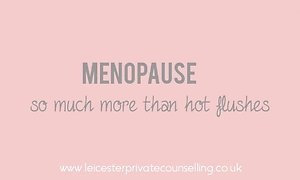Life After Serious Illness
It's often after treatment that it can hit home, come crashing in. That time when the hospital appointments peter out, rehabilitation starts or ends, "go and live your life" is the strong message, maybe a period of sick leave before returning to work, or maybe not returning to work again. It is often at this time that the full impact is felt.
Armed with good advice about lifestyle changes you start the process of trying to return to the old normal, or to adjust to limitations. If treatment has succeeded can you just go back to how we used to be?
When you've lived through a potential life threatening experience such as cancer or a stroke or heart attack, doesn't that change you at a deeper level?
Finding your new way means that your previous priorities and perceptions may now be different. Essentially, a new way of looking and living life can evolve. And in a funny way this may be so much needed.
In the meantime there's a lot going on. Not least other people. You pick up their expectations, their longings and their hopes and fears. What affect does all this have on you?
What about YOUR emotions? What about how you really and truly feel? Can you dare to silently admit these feelings to yourself, let alone family, or good friends? Who can hear? Who can truly stand to hear? You’re supposed to be positive aren't you? With all this going on it can like feel a lonely, bizarre place.
Emotional recovery can be so very difficult. You may keep things to yourself for concern about worrying others. I know that the shock of the experience often lingers on in the background. This really bothers people and can add to their sense of isolation.
The emotional upheaval is massive and it is profoundly important for this to be acknowledged, processed and worked through. It is as important as all the other lifestyle changes. But in my experience it tends to be glossed over.
Yet the thoughts and feelings continue. People are often secretly worried about the illness coming back. We know that to protect others we often hide our fears. Then it all goes underground yet again. For many, the stress created by this particular worry is constant. Your whole body is then reacting as if it is living in a state of stress. This state is one that can seriously slow down or affect recovery.
So, in the case sucessful treatment the physical body heals, yet the emotional/feeling/pschological body often remains largely ignored. This is why some people have trouble with emotional recovery and why it can take a very long time.
It isn’t just about your body recovering. It's also about mind recovering. Because psycholgically you will have taken a battering. And your psychological state works in harmony with your physical state. So your psychological health really matters to your physical body!
The good news is that help is all around you. A few sessions with a good professional can make a huge difference. All you need to do is reach out.
Marina Broadley
Oh how it all builds up
We all tend to think its the very big losses that get us. The tragic losses and the shocking events.
But what about the more 'ordinary' losses? The ones many of us experience as we pass through life...
Your little boy starting school, your daughter spending all her time with her new love, your son moving to another city because of his great new job. Or your Dad remarrying. Your friend from school emigrating. Your family doctor retiring. Your son going to Uni. Or your mum showing signs of dementia. The man across the road losing his wife of 50 years.
The notice on the tree saying 'our cat is lost, please check your sheds'... The medical diagnosis. The FB post that shows a smiling photo of a dad who checked out too early. The news of a celebrity death. Grandad's fall. The sibling you never knew.
Your old childhood home being knocked down. Your dog passing. The first school trip and no contact allowed. The factory closing down. The car written off. The reality of retirement. The divorce papers on the work top. Your sister's miscarriage. The last fertility treatement that didn't work. The block of flats where your school used to be.
Isn't it all endings? Isn't there always a real sense of loss? It can be as it everything has changed. A knowing that things will never be as they were. A trying to let go of how it used to be.... and 'move on'. A wrench. A longing. A sadness. And a fear.
Don't we all feel these things? Pehaps tear up for the way it used to be? Don't we all carry a sadness that we dont mention anymore, if we ever did? Aren't we all continually trying to adapt to the changing landscape of our lives - relentlessly and constantly? Its hard.
Don't we all sometimes wish we could just talk about it without feeling silly? Or without fear of upsetting someone? Or without being told to look on the bright side or that its a 'good thing’... or for the best.... and so on.
Counselling isnt just for the big/tragic/shocking stuff. It isnt because you need fixing. Or because you are 'not right'. Its for processing or dealing with the painful experiences that happens throughout our lives, which, ironically, happens to be extremely good for our physical & mental health.
Marina Broadley
Private. Keep Out.
We can talk about the physical symptoms of menopause quite easily, I find.
Do you? We can chat about them, and laugh them off.
We even tend to be reasonably comfortable sharing these physical experiences.
But what about the emotional issues? The sense of sadness and loss? The struggle to adapt to this life transition? What about the change in how we see ourselves? And our relationship, the intimacy?
How do we make sense of this part of our lives?
Who can we talk to about these deeper changes? There is so much that is hidden. If we don’t feel ‘safe’ talking about it, we hide it. Do you ever wonder ...
...what happens to all the unspoken, the unacknowledged, and the unprocessed thoughts and feelings?
Do you ever wonder about the effects of keeping them hidden?
I do. I work with women everyday who are experiencing the effects. The process of releasing these painful feelings is incredible. I can see it in their faces.
So this little blog is to offer you some comfort. You are not alone. The way you feel at this life stage is real. It is valid. And to grow through it all, we need the right conditions... we need a psychologically safe space to talk.
Can we create that for each other? In or out the counselling room. Can we lead by example, do you think? Often when we open up a little it gives ‘permission’ for the other person to do the same. Hidden feelings fester and make us unwell. There is another way.
Perhaps these words here can be experienced as a gentle acknowledgment that painful thoughts and feelings are understandable at this time of our lives.
Marina Broadley
What I Can’t See Won’t Harm Me...

...will it? Its a widely held belief - what I can’t see won’t harm me. So, I’m sure as heck not going looking for it.
If we think about it, isn’t this what we say and how we think and feel? We turn away. From ‘it’.
We distract ourselves with drink, busyness, buying things... overworking, overeating, overspending. We distract ourselves by filling every nook and cranny with activities. The more the better!
‘It’. What is the it? People talk about it, in counselling, a lot.
It’s really got to me.
It’s reached the point now where it’s just too much...
However hard I try, I can’t get away from it.
I don’t want to talk about it.
I’m just so sick of it.
I just can’t fight it any longer.
I just want it gone.
And so on.
Stale mate
Now it’s a tricky situation. Because on the one hand we want IT gone.
On the other hand we won’t look at IT. Result - Stale mate. High Anxiety.
Another widely held belief is something along the lines of :
It happened. I can’t change it, so why talk about it?
Here’s my take. Whatever IT we are trying to avoid, run from or drown out, isn’t budging. These are known as unresolved issues in counsellor speak. Which is simply hurt that was repressed at the time, and is still here now. IT hasn’t gone away, and IT won’t go away.
Until we look at it.
In fact the longer these unresolved issues are avoided, the more they break out in symptoms such as anxiety, mood swings, OCD. And the worse bit? We then up the anti with our avoidance techniques, so, spend more, do more, drink more.
So what now? Honestly, we simply need to turn to face the IT. With a counsellor, preferably. Once we see it, talk about it, feel it, then the effects lessen. It’s quite incredible.
Ponder this - if you’re struggling, then there’s a reason. Avoiding the reason because it has already happened will not make it go away.
We wish it did. But that’s not how it works.
Marina Broadley





